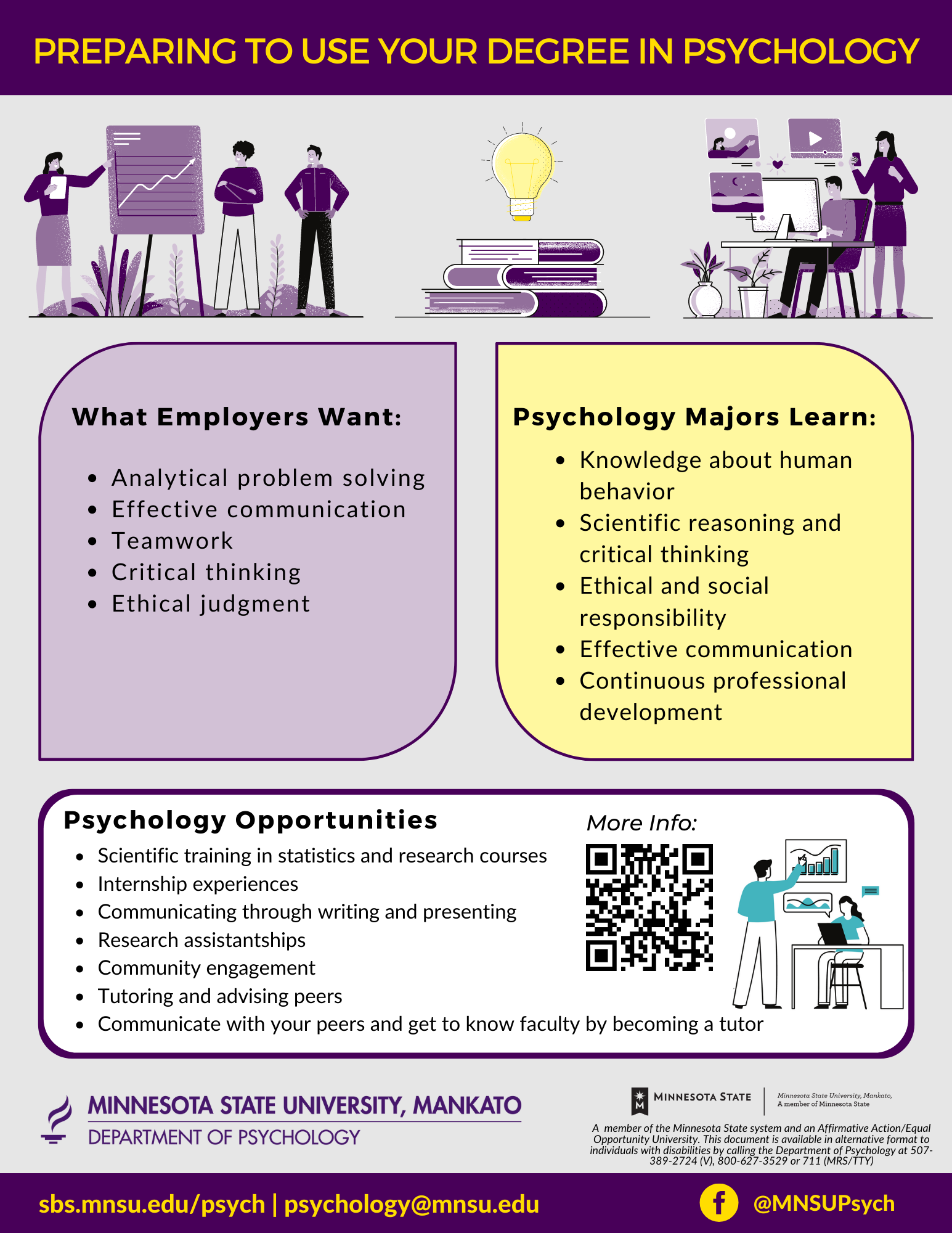Psych Week 2024! What Can I Do With A Psychology Major? Check These Psychology Career Resources!
We’re wrapping up Psych Week with this updated post to help students considering a psychology major understand the wide range of careers available for people with an undergraduate degree in psychology. Many of the resources listed in previous posts also contain great career information, particularly the Psi Chi website.
By Emily Stark and Karla Lassonde
The psychology major gives students an opportunity to develop a range of career skills, including analytical and critical thinking, research and information literacy, communication, and teamwork, among many others (APA, 2018). Employers value these broad skills, but also report that many recent graduates are not prepared to be successful in the workplace (Hart Research Associates, 2015). In psychology, the majority of undergraduates do not immediately go on to a graduate program, but instead choose to work after graduation. While there are a wide range of jobs that are suited for psychology majors, if students do not understand the skills that they have developed in their courses, or cannot apply those skills to different workplace settings and tasks, they may not be successful at finding a job or career that meets their interests and needs.
Psychology Skill Infographic
To help current psychology majors understand both the skills they are developing in the major, and the types of opportunities we offer to help students build their skills, we worked with graphic designers in the College of Social and Behavioral Sciences to create an infographic that concisely summarizes skills employers are looking for and that psychology majors develop. This infographic also directs students to opportunities that we offer that can help them increase their employability, or help them make connections between courses and/or experiences they’ve already completed and how those relate to career skills.
This infographic presents one piece of how the Psychology Department at Minnesota State University, Mankato is helping students connect the dots between what they are learning and their future career goals. We invite others to share ideas for how to build career readiness in students and highlight the value of the psychology major.
Resources for Students
Several of our national organizations related to psychology have created helpful career resources for undergraduate students specifically, sharing job titles, information, and career planning support. Browse some of the links below and at the end of this post to see all the help available for psychology students who are thinking about what to do after graduation:
This 2018 article from the American Psychological Association notes a range of job titles available for students who graduate with a psychology major: https://www.apa.org/ed/precollege/psn/2018/01/bachelors-degree
The Center for Workforce Studies area of the American Psychological Association has released several data tools where you can explore the employment of people at all levels of psychology. The degree pathways tool, linked here, nicely shows the outcomes for people with bachelors, Masters, and doctoral degrees in psychology: https://www.apa.org/workforce/data-tools/degrees-pathways
Psi Chi is the International Honor Society for Psychology, and they maintain a career resource page where you can see examples of resumes, search jobs related to the psychology major, and find other resources on preparing for a career: https://www.psichi.org/page/RES_CareersInPsych#.YeRjWf7MI2w
The Occupational Outlook Handbook for the field of psychology includes information about job titles and other occupational information: https://www.bls.gov/ooh/field-of-degree/psychology/psychology-field-of-degree.htm
Additional References and Career Resources
The Career Development Center at Minnesota State University, Mankato, maintains an extensive list of career and graduate school resources for current MSU students and alumni. Browse their many topics here: https://mankato.mnsu.edu/university-life/career-development-center/career-topic-index/
Naufel, K. Z., Appleby, D. C., Young, J., Van Kirk, J. F., Spencer, S. M., Rudmann, J., …Richmond, A. S. (2018). The skillful psychology student: Prepared for success in the 21st century workplace. Retrieved from: https://www.apa.org/education-career/guide/transferable-skills.pdf
This is a useful resource from the APA that clearly shows skills related to the psychology major and gives students useful terminology to use on their resumes or in interviews when talking about their abilities.
Stark, E. & Hall, L. (2021). Supporting the career success of psychology majors. Poster presented at the annual meeting of the Society for the Teaching of Psychology at the Midwestern Psychological Association Conference.
This poster describes on-going research examining student self-reports of their career skills and confidence in effectively preparing for a career or graduate school. We also include a number of recommendations for instructors and departments to help students see the connections between their coursework and career skills.
The American Psychological Association has a general careers page with information on careers at all levels of psychology: https://www.psyccareers.com/
This site has more information about different areas of psychology and finding graduate programs: https://www.psychology.org/careers/
Falling short? College learning and career success. (2015). Hart Research Associates. https://www.aacu.org/research/falling-short-college-learning-and-career-success
For general information about psychology careers and specific recommendations for undergraduates preparing resumes and for job interviews, look through the articles in this e-book published by Psi Chi. It’s currently available for only $4.99 for Psi Chi members, or $19.95 for non-members: https://store.psichi.org/an-eye-on-the-workplace-achieving-a-career-with-a-bachelors-in-psychology
An Eye on the Workplace: Achieving a Career with a Bachelor’s Degree in Psychology. (2020). Hettich, P., Iles, S., & Cannon, B., Eds. Psi Chi, the International Honor Society in Psychology, Chattanooga, TN.

